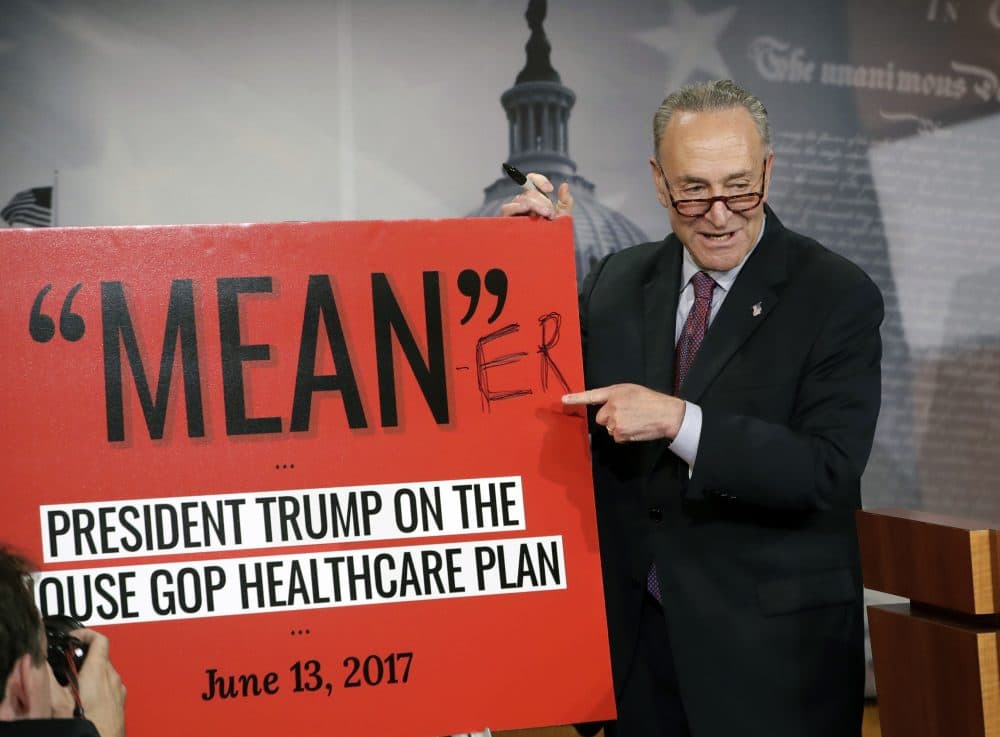Advertisement
Behind Closed Doors, A Health Bill Is Born

Pulitzer Prize-winning author and journalist Ron Suskind and Boston College historian Heather Cox Richardson speak with Yahoo News’ Matt Bai about the Senate Republicans’ health care bill. They discuss the secrecy with which it was drafted, the history of the G.O.P.'s relationship to health care, and the bill's implications for Republicans in the 2018 mid-term elections.
Excerpts

Ron Suskind: The Senate health care bill is really going to affect lives fundamentally. We've been focusing for all of these months on the shiny objects — impeachment, Jim Comey, Bob Mueller. And all of a sudden, your life is going to change because the foundation upon which it rests is now being utterly reshaped.
Heather Cox Richardson: Utterly reshaped in secret by 13 white men.
Matt Bai, Yahoo News: It's a broken process because politicians now believe — particularly Republicans — that there's simply no consequence for your actions. You know, it used to be that there was some fear in both parties about how far you could push things tactically. I think the experience around Merrick Garland particularly has convinced this Republican set in the Senate now that people don't care about the tactics. And until there is a cost for the abuse of the process, I think we're going to get abuse of the process.
Richardson: It's funny that the Republicans right now are standing against health care because, in fact, it's a Republican ideology. They're the ones who come up with the idea in the 19th century, and it really is developed by Theodore Roosevelt. Roosevelt says that we have to have a basic level of health care, because citizens cannot participate effectively in society and cannot really move the economic, social, cultural, political ball forward unless they have control over their health. They have to be able to do that with some kind of a health care system. And then it's Dwight Eisenhower with his Undersecretary of Health Education and Welfare, Nelson Rockefeller, who writes the first federal program for health care. Republicans invented our entire concept of a non-contributory, if you will, entitlement that you were supposed to take part in solely because you were part of America.
Bai: Today, it's a different world and a different government. When Teddy Roosevelt starts to rethink the role of a strong central government, or when Franklin Roosevelt really introduces the basis for modern activist government, there was no federal government to speak of. There was no income tax. There was a vast need for an actor in the marketplace that was not being filled. We don't live in that world. We actually have a vast federal government, and it spends more than it can afford. And for a lot of people in the country of all income levels and all experiences, it fails too often. So when we talk about populism now, a lot of that populist anger is turned on government, not just on corporations, not just on the wealthy. Government is a huge, powerful institution in American life, and it changes the complexion of these conversations in a way you have to acknowledge.
Richardson: One of the reasons there's such populist anger against the government is that, in fact, it is working right now for a very small, very wealthy population. Lots of people are furious at the federal government now, they were furious at the federal government then. Because in each case, a very small group of wealthy men rammed through a law that was dramatically going to affect the vast majority of Americans in a negative way, simply because it would put money in their pockets.
Suskind: Will the Republicans' approach on this health care bill have implications in the 2018 mid-term elections?
Bai: It's a dangerous business looking ahead in elections. But I will tell you, the most salient fact about 2018 is that we have now had 3 straight presidencies in which every president has come in with both chambers of Congress in the control of his party and left with neither. If the question is, does repealing the Affordable Care Act make it more or less likely that that volatility will manifest itself again?, I would say more. So if I had to choose a party to throw my money down on, I wouldn't want to be a Republican in that climate.
Richardson: People aren't happy with any of their choices. I think we're going to have the population throwing up new leaders that look at programs like health care and say, "Listen, this is what I need."
Suskind: You know, nothing is more fundamental to people's sense of security than the fact that they are profoundly vulnerable in the event of illness. At what point do we hit a kind of bedrock in the country? — where people say, look, I'm not asking for much. I'm just asking for what the rest of the world takes for granted, so that I'm not up at night saying, my God, my kid is handicapped. He can't get care, or he'll be hungry when I die. Government does not believe what every philosopher, every religious leader says over and over again: A country is judged by what it does for its least fortunate and most vulnerable members. Throughout history that judgement will hold. Why is it no one can see that and say, please, make this work? Can't government do that, if nothing else?
The views and opinions expressed in this podcast are solely those of the participants and do not in any way reflect the views of WBUR management or its employees.
